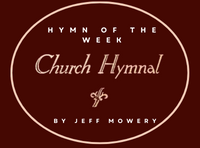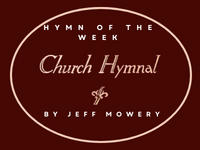Fairest Lord Jesus
Fairest Lord Jesus, Ruler of all nature, O Thou of God and man the Son,
Thee will I cherish, Thee will I honor, Thou, my soul’s glory, joy and crown.
Fair are the meadows, fairer still the woodlands, Robed in the blooming garb of spring;
Jesus is fairer, Jesus is purer, Who makes the woeful heart to sing.
Fair is the sunshine, Fairer still the moonlight, And all the twinkling starry host;
Jesus shines brighter, Jesus shines purer than all the angels heaven can boast.
All fairest beauty, heavenly and earthly, Wondrously, Jesus, is found in Thee;
None can be nearer, fairer or dearer, than Thou, my Savior, art to me.
Beautiful Savior! Lord of all the nations! Son of God and Son of Man!
Glory and honor, praise, adoration, Now and forever more be Thine.
This is a favorite “spring-time” hymn of mine. I hope this particular one speaks to someone because the Lord has confirmed this one 3 different times over the last week (the thought was part of two Bible studies and the handbell choir at Church played this song Sunday night) so I hope you get something out of it. I am reminded of the words in the second verse of this hymn this time of year – “Robed in the blooming garb of spring” – when I see the dogwood trees, the azaleas blooming, and the other plants and trees that appear to come to life this time of year. It is unclear as to how old this hymn actually is. Parts of it were translated in the 1600’s, but some folks believe it was written even earlier than that. One of the key theological truths that is reinforced in this hymn is the truth that Jesus was fully God and fully man. He wasn’t born a man and became God. He was Deity clothed in humanity. He wasn’t “made by the Father” but was “begotten of the Father.” He is eternal. This is not a concept that is necessarily easy to understand and fully grasp, but true nonetheless and an important theological concept as we desire to understand the Bible more fully.
What I like about this song is that it takes earthly things that we know and see every day, and compares them to Jesus with a reminder that He is better than or greater than any of these earthly things we can compare Him to. If you think about it, this should be the case. Isn’t it normal for the Creator to be greater than the created things? This hymn reminds us that He is fairer than the beauty of spring. He is purer than the white lilies we see in the field. He is brighter than the sun, moon and stars combined. He is nearer to us than our family and friends. And finally, He should be dearer to our hearts than anything else in our lives. In comparison to the things of this world (even the most beautiful things of this world), they quickly become dim in the light of His Greatness and Glory.
If you are a parent, especially a parent with multiple children, you have probably heard the phrase “That’s not fair” or even worse, “You’re not fair.” My kids have reminded me that sometimes I am not fair. This is especially true of my eight-year-old, Grace. She has informed me that I let Tyler have more freedom that she gets, or that I pay more attention to Maddie since she is the baby. She once told me that I didn’t carry her to bed as much as I did Maddie because she counts every time I do it. It bothered me a little because I think all parents try their best to balance their love and attention among their children. However, I also know that my children have different personalities, different needs, and are at different stages of life. Therefore, I have at times chosen to treat them differently, not because I don’t love them any differently, but because I know what is best for them at certain times.
Have you ever said to God “That’s not fair” or “You’re not fair?” I don’t want a show of hands, but I do think we wonder why some are blessed and some aren’t. Why some are punished and some aren’t? You will find those kinds of statements many times in the Psalms when comparing the wicked and the righteous. If we are honest with ourselves, we have probably done the same thing. However, I am reminded of two things. First, our idea of “fair” is often times skewed. We are like the workers in the parable who were paid an agreed upon wage for working all day (treated fairly), but were angry because workers who only worked an hour got the same wage. My pastor recently made the statement that “God is not fair.” He followed this up by saying, God is never less than fair, but is always more than fair, and this parable teaches that truth. I like to think He is the “Fairest” in both the sense of this hymn (the most beautiful), but also in the way He treats us. In the parable, the landowner was fair to the workers that worked all day – he paid what he agreed. He was more than fair to the workers who worked the last hour of the day. Secondly, God is sovereign and it is impossible for us to completely understand “fairness” from His perspective. If we realize that He is in control and that He knows what is best for us, we can trust in His Sovereignty, and not necessarily worry about this earthly concept of “fairness.”
One definition of “Grace” is “Unmerited favor” so God’s Grace is inherently “unfair” because we get what we don’t deserve. So I have decided that when my daughter Grace tells me I am not fair, I will tell her that “Grace is not fair either.” How do you like that comeback?

